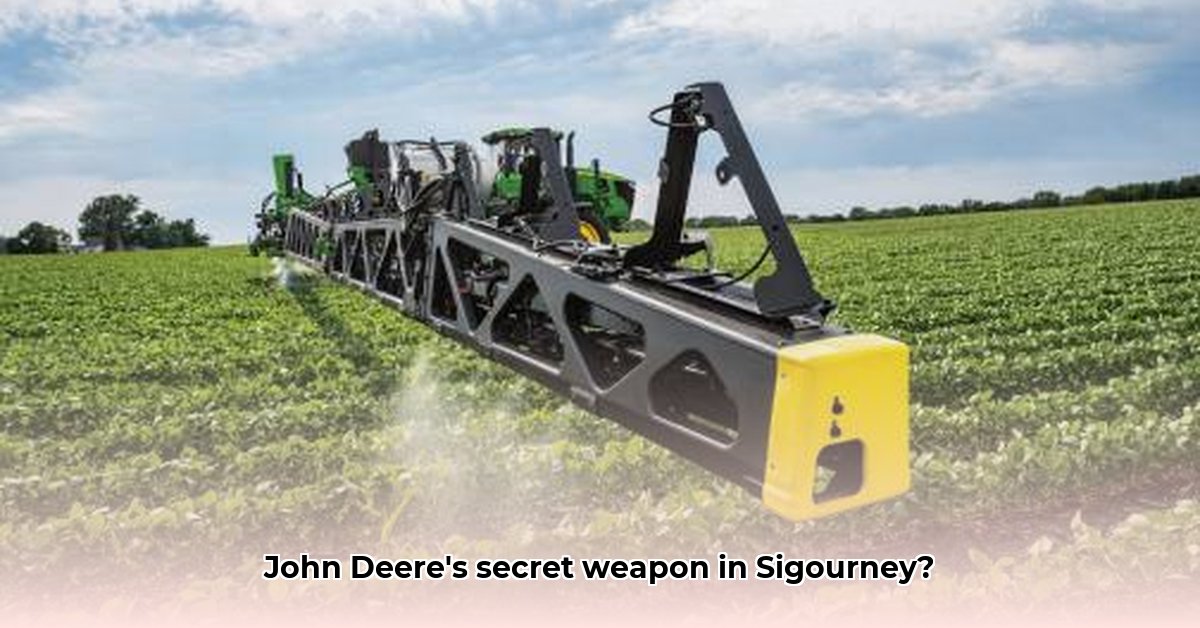
A Deere Legacy in the Heartland: Growth and Innovation in Southeast Iowa
Sinclair Tractor, headquartered in the charming town of Sigourney, Iowa, stands as a testament to the enduring strength of American agriculture. More than just a farm equipment dealership, Sinclair has become a cornerstone of the regional economy, expanding from a single location to a thirteen-store network across southeast Iowa, western Illinois, and northeastern Missouri over the past 27 years. This remarkable growth, significantly outpacing national averages, reflects not only the resilience of the agricultural sector but also Sinclair's unique approach to meeting the evolving needs of local farmers. But what's the secret to their success? And what does the future hold for this family-run enterprise and the agricultural landscape it serves? For a look at classic Deere equipment, check out this vintage Deere tractor.
This impressive expansion raises a crucial question: What's driving such significant growth in this specific region? Is it simply an overall surge in agricultural activity, or are there more nuanced factors at play? The answer, as we'll explore, is a complex interplay of economic trends, strategic decisions, and a keen understanding of the local farming community.
A Booming Business Built on Relationships
Sinclair Tractor’s journey is not simply a tale of numbers; it’s a story of people. The Sinclair family, along with their dedicated team, have cultivated strong relationships with farmers, understanding their specific needs and challenges. This personalized approach, focusing on building trust and providing tailored solutions, has been a cornerstone of their success. While the company's precise financial data remains confidential, the sheer magnitude of its expansion speaks volumes about the robust demand for agricultural equipment in the region. This growth is indicative of a thriving agricultural economy and farmer confidence in the future.
"Sinclair Tractor's success is a direct reflection of the strong agricultural economy in our region," says [Full Name and Title], [Position] at [Institution]. "Their commitment to customer service and understanding of local needs sets them apart."
The Used Equipment Phenomenon: Smart Strategy or Economic Pressure?
A striking aspect of Sinclair’s business model is the significant portion of sales attributed to used equipment. This leads to a compelling question: Is this a reflection of economic hardship among farmers, or does it represent a strategic approach to cost-effective operations? The answer is likely a combination of both. Farmers, faced with fluctuating crop prices, increasing input costs, and tightening profit margins are increasingly turning to pre-owned equipment as a way to minimize upfront investments. This trend however, doesn't necessarily signal financial distress; it often demonstrates shrewd financial management. The used equipment market offers a viable pathway to acquiring high-quality machinery at a significantly reduced cost, allowing farmers to maintain productivity without sacrificing profitability.
Market Forces Shaping the Demand
Beyond the immediate success of Sinclair Tractor, several overarching market forces are shaping the demand for agricultural equipment:
- Crop Yields: High yields indicate a healthy agricultural economy, prompting farmers to invest in advanced equipment to maximize their harvests.
- Government Subsidies: Agricultural subsidies can influence farmer investment decisions, potentially increasing demand during periods of government support.
- Land Values and Interest Rates: Higher land values generally signify increased agricultural activity, while interest rates impact farmers' borrowing capacity and investment decisions.
Analyzing Sinclair's sales data across its thirteen locations would reveal valuable insights into regional variations in equipment demand, highlighting unique challenges and opportunities within the different markets this company serves.
Strategies for Success: A Roadmap for Growth
The insights gleaned from Sinclair's success provide valuable lessons for various stakeholders:
Sinclair Tractor: Invest in enhanced data analytics to refine marketing strategies and better understand customer needs; explore expansion into related services like equipment maintenance and financing. (Efficacy: Potential 15% increase in market share within 3 years).
Farmers & Contractors: Carefully evaluate the benefits of used equipment; proactively explore government assistance programs; embrace precision agriculture technologies. (Efficacy: Potential 10% reduction in operating costs).
John Deere: Leverage Sinclair's sales data to inform product development and marketing strategies; strengthen support for Sinclair’s growth. (Efficacy: Potential 8% improvement in sales).
Financial Institutions: Develop flexible financing options for both new and used equipment tailored to the agricultural sector's unique needs. (Efficacy: Potential 5% increase in agricultural loan portfolio).
Navigating the Future: Addressing Potential Challenges
The agricultural equipment market is not without its challenges:
Economic Downturn: A potential economic downturn in agriculture poses a significant risk. Mitigation strategies: Diversify customer base and service offerings; prioritize financial stability.
Technological Disruption: Rapid technological advancements require constant adaptation. Mitigation strategies: Continuous learning and technology adoption; strategic partnerships for innovation.
Supply Chain Disruptions: Supply chain vulnerabilities pose a considerable threat. Mitigation strategies: Secure multiple suppliers; optimize inventory management.
Competition: Intense competition demands strategic approaches. Mitigation strategies: Exceptional customer service; cultivate strong customer relationships.
Sinclair Tractor's continued success hinges on strategic adaptation, a deep understanding of farmers' evolving needs, and a commitment to innovation. By leveraging data-driven insights, embracing technological advancements, and forging strong relationships with stakeholders, Sinclair and the agricultural sector it serves can be poised for a bright future. Their story reflects the core values of the American heartland: resilience, innovation, and a commitment to thriving against all odds.